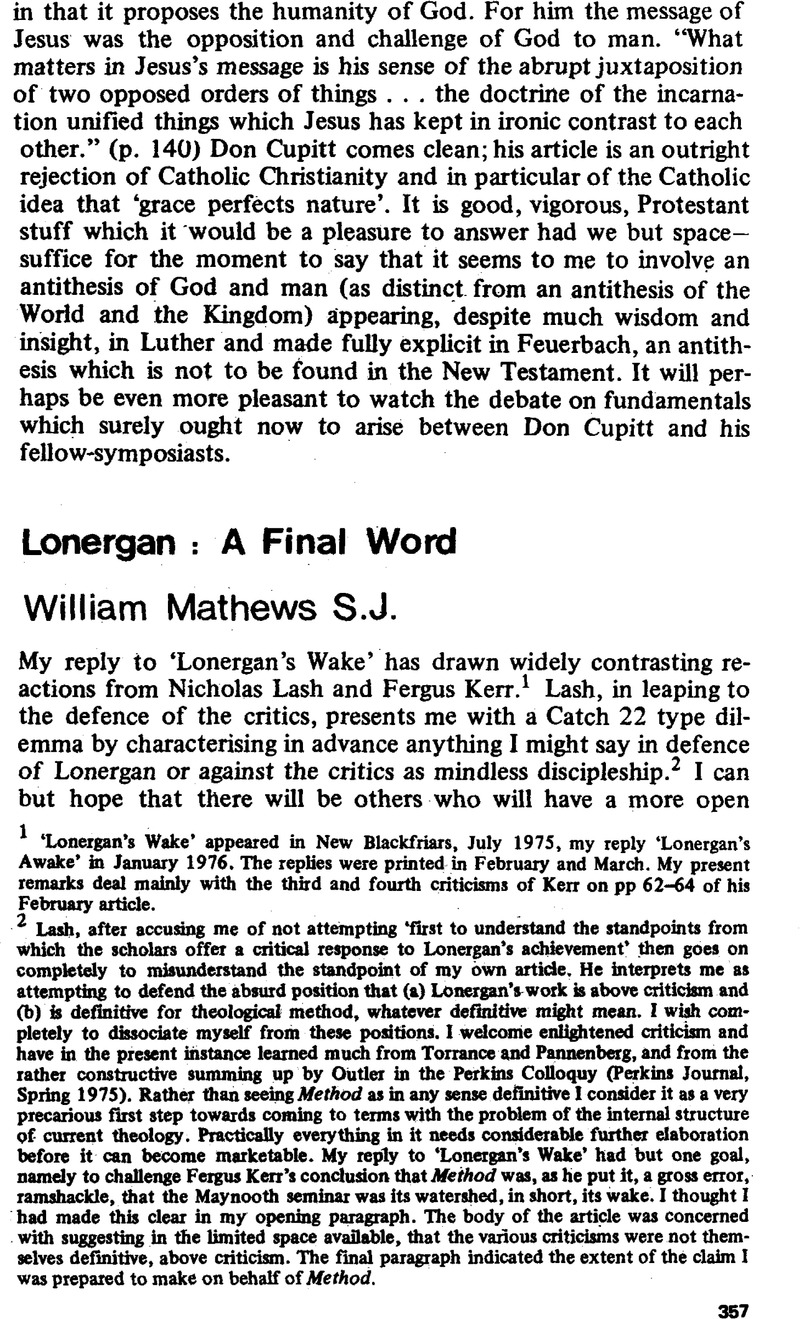No CrossRef data available.
Article contents
Lonergan: A Final Word
Published online by Cambridge University Press: 02 April 2024
Abstract

- Type
- Reply
- Information
- Copyright
- Copyright © 1977 Provincial Council of the English Province of the Order of Preachers
References
1 ‘Lonergan's Wake’ appeared in New Blackfriars, July 1975, my reply ‘Lonergan's Awake’ in January 1976. The replies were printed in February and March. My present remarks deal mainly with the third and fourth criticisms of Kerr on pp 62–64 of his February article.
2 Lash, after accusing me of not attempting ‘first to understand the standpoints from which the scholars offer a critical response to Lonergan's achievement’ then goes on completely to misunderstand the standpoint of my own article. He interprets me as attempting to defend the absurd position that (a) Lonergan's work is above criticism and (b) is definitive for theological method, whatever definitive might mean. I wish completely to dissociate myself from these positions. I welcome enlightened criticism and have in the present instance learned much from Torrance and Pannenberg, and from the rather constructive summing up by Outlet in the Perkins Colloquy (Perkins Journal, Spring 1975). Rather than seeing Method as in any sense definitive I consider it as a very precarious first step towards coming to terms with the problem of the internal structure of current theology. Practically everything in it needs considerable further elaboration before it can become marketable. My reply to ‘Lonergan's Wake’ had but one goal, namely to challenge Fergus Ken's conclusion that Method was, as he put it, a gross error, ramshackle, that the Maynooth seminar was its watershed, in short, its wake. I thought I had made this clear in my opening paragraph. The body of the article was concerned with suggesting in the limited space available, that the various criticisms were not them‐selves definitive, above criticism. The final paragraph indicated the extent of the claim I was prepared to make on behalf of Method.
3 See his ‘The Current Crisis in Theology as it Affects the Teaching of Catholic Doctrine’ in Crises Facing the Church, London 1975Google Scholar. The first part of this book as well as Eric Doyle's ‘Believing: Its Relationship to Scripture and Creeds’, Clergy Review, May 1976, pp 178‐182 provide some essential background for Method.
4 Is not this point raised by Kerr and Coulson nearly a dead issue in theology at the moment? Brown (op. cit. p 22) shows that the situation is not all that polarised with respect to Christology.
5 I have in mind here the very complicated studies of authorship, composition, and theology of, for instance, the Pentateuch and the Gospels, the works of Noth on the O.T. the redaction studies of Luke by Conzelman, Franklin etc. of Matthew by Bornkam et al, and the spate of exegetical works and commentaries on John. It is noticeable that few of the witnesses that Kerr summons against Lonergan are theologians.
6 See The Jerome Biblical Commentary, Vol I, p 209, for a summary of Noth's account of deuteronomic history.
7 See Avery Dulles, The Survival of Dogma, p 173.
8 Although Lonergan has not directly addressed himself to Freud and Kierkegaard I wonder if Kerr has given sufficient attention firstly to Lonergan's considerations of the dialectical development of religion (Method p 110f), and secondly, to his recognition in the chapter on Foundations that although the basis of theological categories is the love of God expounded by St Paul, none‐the‐less one has to account for neurotic and aberrant religion (Method p 284f).
9 This is made clear in a report of the conference in the Irish Theological Quarterly, July 1972, p 294.
10 ‘Self‐Reference and Self‐Awareness’, The Journal of Philosophy, October 1968, p 567. See also Hacker, , Insight and Illusion, Wittgenstein on Philosophy and the Metaphysics of Experience, Oxford 1972Google Scholar, pp 204f, and 262f.
11 Geach, Mental Acts, p 3: God and the Soul, p 32. Malcolm, ‘Wittgenstein on the Nature of Mind’, American Philosophical Quarterly Monograph, No 4: Studies in the Theory of Knowledge, 1970, p 16.
12 Lonergan would never use the term ‘looking’ here. Malcolm (op cit. p 18, n 27) draws our attention to Wittgenstein's attack on the idea of the ‘ inner’. Lonergan's comparable attack is on the notion of knowing as a matter of taking some kind of look, and of self‐knowledge as a matter of looking into oneself.
13 Olafson in ‘Husserl's Theory of Intentionality in Contemporary Perspective’Nous, Vol IX, No 1, March 1975Google Scholar, holds that Husserl reacted against the mentalistic intentionality of Brentano and Meinong for whom the object of a mental act was internal, inner, intra‐mental. For Husserl ‘Intentionality is thus no longer the relationship of a mental act to its infra‐mental object, but rather the basic vehicle of objective reference generally and thus of our knowledge of the world which Husserl speaks of as a comprehensive intentional object’ (p 76). Olafson stresses that Husserl was not interested in the psycho‐logical factors governing mental acts but mainly in their referential functions, their semantic role, which is the concern of intentionality analysis. Lonergan's notion of intentionality corresponds with that which Olafson attributes to Husserl but not Brentano or Meinong.


